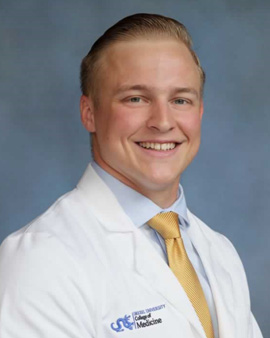
Background
Hometown: Chestertown, Maryland
Undergraduate: University of Maryland, BS in Neurobiology and Physiology
Graduate: Drexel University College of Medicine, MS in Medical Science
Accepted Medical School: Drexel University College of Medicine 2021
Q&A
Can you tell me a little bit about yourself before you came to Drexel?
I'm a simple country boy from Maryland. I like hunting, fishing, weightlifting, and hanging out with friends as much as I can. I went to the University of Maryland and graduated with a neurobiology/physiology degree in 2014. Then, before coming to Philly, I took a year off to work and save money to return to school.
Why did you choose the Medical Science program at Drexel?
I heard about the program through my mom. Once I was home for the year, she was doing research. She knew that I was interested in doing some post-bac before I eventually applied to medical school. I knew I wanted to stay on the East Coast and was considering a few places. She told me to take a look at Drexel. I read about the program, and it seemed like it had everything I needed as far as where I wanted to go.
What was your relationship with the faculty like?
In the first year, I pretty much kept to myself. I kept my head down studying, so I didn't build many relationships. The second year, that all changed. I have very strong relationships now from my experiences that year. I was a teaching assistant in one of the classes I took. I also worked in a lab, and I talked to my advisor a lot. I talk to Dr. Hurley, the program director, all the time now and have very strong bonds with her and a number of other doctors.
Did you find the faculty to be supportive of you?
Yes, definitely. One example, which I tell everyone, is that after my interview for medical school at Drexel, I was waitlisted. Without me even asking, Dr. Hurley wrote a letter of recommendation for me and got everybody to sign it. I was going to go to ask her to do that, but she had already done it on her own. It gives you an idea of how supportive they are of their students.
What was your relationship like with other students in the program?
It's a small program, consisting of about fifteen students, so you get to know each other. I developed some great friendships with people who are now in the medical school with me as well as students that went elsewhere who I keep in contact with. I feel like I have made lifelong friends.
Did the program help you get into medical school?
Definitely. It not only helped me get in, but it's making medical school easier too, since you take real medical school classes in the Medical Science program. Being exposed to that was really helpful.
Can you tell me about the lab you worked in?
I worked at Queen Lane for Dr. Raghupathi in the Neurobiology and Anatomy Department. I did traumatic brain injury research with a fellow MMS student, which is a little against the norm. Typically, you have your own project in your own lab and you're working under post-docs or PhD students. However, this was our own project with a lot of moving parts. We were responsible for everything, from surgeries, to behavioral testing, tissue collection, and histology. I learned so much through this.
Were you interested in you research topic before?
Yes. I played football for twelve years and have suffered a few concussions, so traumatic brain injury is definitely of interest to me, especially with Chronic Traumatic Encephalopathy (CTE) awareness being so big these days.
Do you know what area of medicine you might go into?
In medical school, you see new things, and they grab your attention. I'm probably pulled in five different directions right now. I like gastrointestinal. I like cardiology. I like neuroscience. It's hard to see where I might go right now.
What advice would you give to someone who's considering the Medical Science program?
If you're really serious about getting into medical school or even just learning more about research or science, I would suggest doing this program because there are so many different facets that are great. One, the faculty here have your back. If they see that you're committed to the program, they're committed to you. Two, you get exposure to the actual medical school coursework. There are a lot of post-bac options, but they don't offer actual medical school coursework with the medical school faculty.
Once a student has been accepted to the program, I would tell them, "Congratulations, but get ready for probably the hardest two years for your life to date, but also the most rewarding." If you're willing to put in the work, you will be rewarded. But it's going to be a lot of work—not only finishing program, but exceling in it in order to be noticed by medical schools or a job. If you decide you don't want to go to medical school, this master's will give you the opportunity to pursue other jobs in science, like research, but it's only going to work if you really push yourself. I'm living proof of it. I worked really hard, and I got to where I wanted to go because of the master's program.